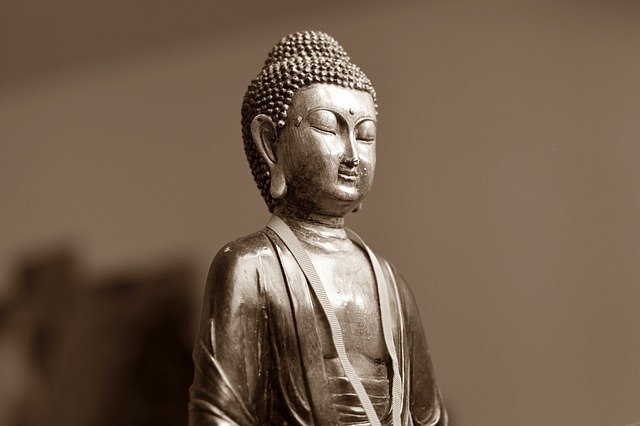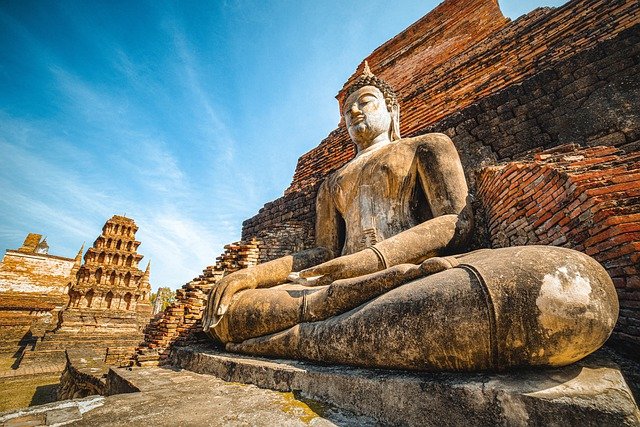Metta parami, or the perfection of loving-kindness is the ninth of the ten paramis of Buddhist practice. What is loving-kindness? It is the deep wish we have that all beings are happy and are free from suffering in mind and body. Having this strong wish for ourselves and all beings to dwell in happiness, this is metta (Pali).
Metta Parami in Action
In Buddhist practice, we learn to cultivate metta in our mind, speech and body.
To develop loving-kindness in the mind, we can practise metta meditation by sending thoughts of loving-kindness to ourselves. Then we start to send thoughts of metta further out of us towards beings in the same room, house, street, city, and country to the entire universe. This we call mano-kamma metta.
Besides practising metta with our mind, we also practise it in speech (Vaci-Kamma metta) and body (kaya-Kamma metta). We try to speak in a way filled with metta and avoid harmful and harsh speech that can cause hurt to others or separate them from loved ones. We can also perform loving-kindness with our bodies by helping others physically.
Metta has a healing impact on ourselves and others. Whenever you are ill and someone tries to cheer you up, it gives you more positive energy and reduces your mental and physical pain. Metta doesn’t heal every sickness but it is positive support for the healing of body and mind for ourselves and others.
Every psychologist can tell you that many of our sicknesses come from non-acceptance. We can’t accept ourselves or others. We have anger and aversion to situations and people and it can cause physical and mental sickness. Metta is really helpful to counter that.
Metta Ripens all Paramis
All the ten perfections come into maturity through metta. If you practise generosity (dana) with loving-kindness, it creates a perfect combination because you give out of loving-kindness, not wanting anything in return. Ethics (sila) parami when paired with metta is also very powerful. Without metta, ethics can become harsh and unaccepting. With metta, we are able to be forgiving towards others.
The third perfection – nekhamma (renunciation) parami allows us to give up unnecessary things in our lives with loving-kindness. Without metta, it can cause us suffering to practising renunciation, because we might become too extreme, not following the middle path anymore. Wisdom, the fourth parami, is a sharp sword that cuts through ignorance. But this sharpness can be harsh and also can cause hurt without loving-kindness.
Effort, the fifth parami, helps us to purify the mind. When we make an effort without metta, it can cause us to inflate our ego. The perfection of patience also needs loving-kindness. Without metta, it is very difficult to practise patience. It helps us to let go of things that are unpleasant to us and it is impossible to practice metta without patience and acceptance. Metta also softens the bluntness of truthfulness that can be hurtful to others. Aditthana (determination) can become forced without metta for ourselves and others. The tenth parami is upekkha (equanimity) – a feeling of balance. Without metta, equanimity can create friction, others might think we don’t care. As we can see, metta parami is very important to develop all the paramis.
The Eleven Blessings of Practising Metta
In the Anguttara Nikaya, the Buddha said to the monks there are eleven blessings to practicing metta. One sleeps happily and wakes up happily; one does not suffer bad dreams and is dear to human beings. One is also dear to non-human beings; the Gods protect those with metta. No fire, poison, or weapon harms one who has metta since one is harmless and dear to others. With metta, our minds can get concentrated quickly, and our faces become serene. With metta, we die unperturbed since there are no enemies. The Buddha also said, for one who practices metta, if s/he fails to attain higher states of mind, s/he will at least reach the state of the Brahma world.
In Buddhist teachings, the world of Brahma is a mind without a body. It is very focused and very blissful. Brahmas live in this state all the time. After you pass on, you might go to this state if you have attained higher jhanas (absorption). Devas still have fine material bodies but not Brahmas. Jhanas can lead you to experience the Brahma realm.
The Near and Far Enemies of Metta
It’s important to know the near and far enemies of metta. The near enemy of metta is lust or tanha. Having a strong attachment to a person is not metta. We have to be careful with that. We may think we love a person, but it’s not real love. Real love is wide and can be given to all beings. It’s unconditioned.
Worldly love is always conditioned by the person we give our love to. If the person changes, then we take our love away. This is egoistic love and is not metta. It’s wanting someone to be like this or that. If they change, we don’t love them anymore.
The far enemy of metta is hatred or dosa. The mind cannot have metta or anger together. They cannot exist together. But hatred is not such a dangerous enemy compared to lust because we can see that it is very different from metta.
Hopefully, this will give you an understanding of metta, which is part of the four Brahmavihara.



